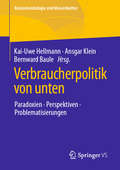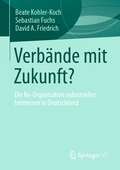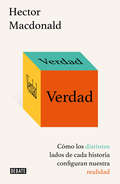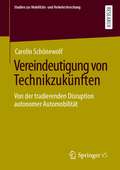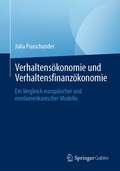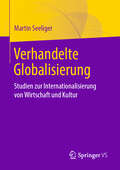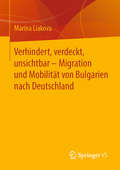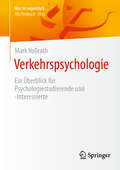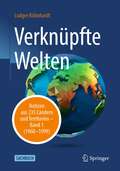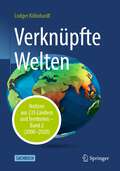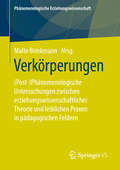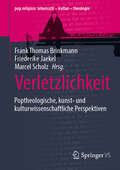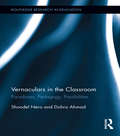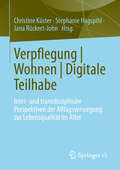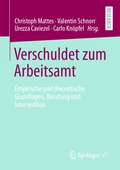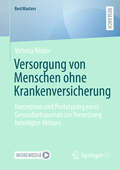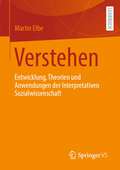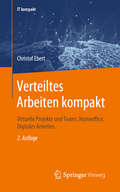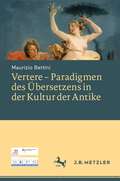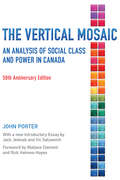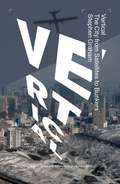- Table View
- List View
Verbraucherpolitik von unten: Paradoxien, Perspektiven, Problematisierungen (Konsumsoziologie und Massenkultur)
by Ansgar Klein Kai-Uwe Hellmann Bernward BauleVerbraucherpolitik wurde in Deutschland seit ihrem Bestehen in den 1950er Jahren vorwiegend als ein Aktions‐ und Maßnahmenbündel verstanden und betrieben, das in erster Linie staatlicherseits initiiert und institutionalisiert wurde. Oftmals auch wurden von Staats wegen entsprechende Aufträge erteilt und Fördermodelle aufgesetzt, wodurch ein Erscheinungsbild entstand, als ob man es im Grunde nur mit einer durch die Makropolitik verordneten ‚Verbraucherpolitik von oben‘ herab zu tun hätte. Nicht, dass in diesen zurückliegenden Jahrzehnten nicht auch immer wieder Versuche unternommen worden wären, verbraucherpolitische Anstöße aus der Mitte der Zivilgesellschaft – oft in Gestalt kleiner Bürgerinitiativen – zu geben. Und gerade in den letzten Jahren sind einige neue Verbraucherorganisationen entstanden, die ungleich basisnäher operieren. Dennoch scheint sich bei den großen, regierungsnahen ‚Playern‘ im Feld, die schon jahrzehntelang im ‚Geschäft‘ sind, von der regierungsinternen Verbraucherpolitik ganz zu schweigen, der Eindruck festgesetzt zu haben, Verbraucherpolitik betreffe ein Politikfeld, das im Wesentlichen durch eine Kollaboration von Staat einerseits, sämtliche Verbraucher und Verbraucherinnen gleichermaßen vertretenden Verbraucherschutzorganisationen andererseits bestellt wird, während die vielen kleinen Verbraucherinitiativen, von einzelnen engagierten Verbrauchern oder Verbraucherinnen gar nicht erst angefangen, demgegenüber regelmäßig ins Hintertreffen geraten. Diese Perspektive bezieht sich größtenteils auf die Sicht auf und aus dem Zentrum der Politik heraus. Diesem institutionell vorherrschenden Eindruck, es gäbe im Prinzip nur ‚Verbraucherpolitik von oben‘, die wirklich schlag‐ und durchsetzungsfähig sei, soll mit diesem Band ein Stück weit entgegengewirkt werden.
Verbände mit Zukunft?: Die Re-Organisation industrieller Interessen in Deutschland
by Sebastian Fuchs Beate Kohler-Koch David A. FriedrichDas Buch setzt sich mit der Zukunft der deutschen Wirtschaftsverbände auseinander. Gerade die Industrieverbände passen sich der dynamischen Veränderung ihrer Umwelt an. Mannigfache Reorganisationen haben zu Wandel geführt, aber die Grundstrukturen des Verbändesystems und die Doppelfunktion der Verbände als Interessenvertreter gegenüber Politik und Öffentlichkeit und als Dienstleister ihrer Mitglieder blieben erhalten. Die empirische Analyse der Anpassungsstrategien im nationalen und europäischen Rahmen sowie die Auswertung neuer Daten stützen die Prognose von Stabilität im Wandel.
Verdad: Cómo los distintos lados de cada historia configuran nuestra realidad
by Hector Macdonald¿Verdad o mentira? Las cosas casi nunca son tan sencillas.Un alegato a favor de la verdad en tiempos de posverdad. Hay más de una verdad acerca de casi todo. Comer carne es nutritivo, pero también perjudicial para el medioambiente. Internet difunde el conocimiento, pero también el odio. Como es lógico, cuando nos comunicamos seleccionamos aquellas verdades que son más favorables a lo que nos interesa defender. Podemos elegir verdades de manera constructiva para inspirar a nuestros compañeros, animar a las nuevas generaciones y fomentar cambios positivos. O podemos optar por aquellas que proyectan una imagen falsa de la realidad y engañan a la gente sin mentir. Los demás pueden hacer lo mismo, motivarnos o manipularnos mediante la verdad. Las verdades son herramientas neutrales y muy versátiles que podemos emplear para bien o para mal. En Verdad, Hector Macdonald explora cómo se usa y abusa de la verdad en la política, los negocios, los medios de comunicación y la vida cotidiana, para demostrar que una mejor comprensión de las muchas caras de la verdad nos ayuda a navegar mejor nuestro mundo e influir más en él. Macdonald combina su talento narrativo con lecciones prácticas y una sucesión de historias fascinantes, divertidas e iluminadoras. Verdad es un libro necesario y adictivo acerca de cuán profundamente nuestras acciones y opiniones se ven influidas por las verdades que deciden contar quienes nos rodean
Vereinbarkeit und Schwangerschaft: Psychische Belastung durch Antizipation? (essentials)
by Okka Zimmermann Lina KolonkoSchwangerschaft sowie Vereinbarkeit von Beruf und Familie werden in der Soziologie in den letzten Dekaden verstärkt sozialwissenschaftlich erforscht, bisher jedoch nicht zusammengebracht. Die Studie arbeitet daher heraus, dass bereits in und vor der Schwangerschaft die grundlegenden Weichenstellungen für Vereinbarkeit gestellt und verhandelt werden; dabei kann die Antizipation von Problemen und Konflikten eine große psychische Belastung darstellen.
Vereindeutigung von Technikzukünften: Von der tradierenden Disruption autonomer Automobilität (Studien zur Mobilitäts- und Verkehrsforschung)
by Carolin SchönewolfCarolin Schönewolf untersucht die soziotechnische Transformation der Automobilität durch die Linse der Technikzukünfte des autonomen Fahrens. Die Analyse von Vereindeutigungen an drei Fallstudien zeigt den Umgang mit der paradoxen Gleichzeitigkeit von disruptiver Innovation und linearer Entwicklung. Anstatt sich auf Disruption oder Linearität zu konzentrieren, schlägt die Autorin vor, die soziotechnische Transformation als einen iterativen Prozess zu verstehen, der eine adaptive Governance erfordert.
Vergeben in Beratung und Therapie: Eine praxisnahe Einführung (essentials)
by Agostino Mazziotta Jonas ReinhardtIn zwischenmenschlichen Beziehungen ist es nahezu unausweichlich, dass Menschen sich gegenseitig verletzen. In manchen Fällen gelingt es den Betroffenen jedoch nicht, diese Verletzungen zu verarbeiten, Rachefantasien und negative Gefühle auf den Verursacher ruhen zu lassen. Vergebung ist eine Möglichkeit, eigene Verletzungen zu bewältigen. Ärger, Hass oder Verbitterung werden dabei losgelassen, um eine freundlichere und mitfühlendere Haltung gegenüber einer verletzenden Person zu entwickeln. Diese veränderte Haltung kommt der vergebenden Person zugute, da sie etwa das Wohlbefinden und die Gesundheit verbessern kann. Im Rahmen einer Beratung oder Therapie können Menschen, die vergeben wollen, auf ihrem Weg unterstützt werden. Dieses Essential bietet eine wissenschaftlich fundierte Einführung in interpersonelle Vergebung und eine praxisnahe Anleitung für die beraterisch-therapeutische Begleitung von Vergebungsprozessen.
Verhalten bei Gewalt – Selbstschutz für Erwachsene: Dein persönliches Konzept für Gewaltprävention und Selbstverteidigung
by Swen Körner Mario S. StallerDieses Buch haben wir für all jene geschrieben, die sich im Umgang mit – auch körperlichen – Konflikten vorbereiten wollen, um sich noch sicherer zu fühlen. Vielleicht hast du ja selbst schon einmal Gewalt erlebt und bist in eine brenzlige Konfliktsituation geraten: Jemand hat dich im Supermarkt doof angemacht, als Fußgänger missachtet, auf einer Feier beleidigt, dir Prügel angedroht. Im Nachgang hast du dich vielleicht gefragt, wie du besser hättest reagieren können.In sechs Etappen und anhand konkreter Beispiele führen wir dich zu einem kompetenteren Umgang mit Gewaltsituationen: von der Einschätzung einer Konflikt- und Gewaltsituation über Gewaltprävention bis hin zu einfachen Selbstverteidigungs-Optionen. Wir haben versucht, das Buch leicht lesbar und anschaulich zu schreiben. Innerhalb einzelner Kapitel schildern wir Konflikt- und Gewaltsituationen. An diesen Situationen machen wir fest, was du tun kannst, um Konflikte zu vermeiden und dich und andere vor Gewalt zu schützen. Zum Schluss zeigen wir in bebilderten Darstellungen einige Tricks und Techniken zum Selbstschutz. Schließlich fassen wir jedes Kapitel mit Empfehlungen für dich zusammen. Aus dem InhaltIn 6 Etappen zum kompetenten Umgang mit Gewaltsituationen – mit Tipps zum Üben46 Werkzeuge zu Gewaltprävention, Selbstschutz und Selbstverteidigung – von Abstand halten bis HammerfaustReale Situationen: in der S-Bahn, an der Supermarktkasse, auf dem Parkplatz, nachts nach dem Clubbesuch, häusliche Gewalt
Verhaltensökonomie und Verhaltensfinanzökonomie: Ein Vergleich europäischer und nordamerikanischer Modelle
by Julia PuaschunderDieses Buch untersucht menschliche Entscheidungsfindung und erklärt wie die Verhaltenswissenschaft Menschen helfen kann, rationalere Entscheidungen zu treffen. Moderne ökonomische Erkenntnisse werden realitätsnah auf politische Themen angewandt, um verhaltensorientiert dem Gemeinwohl zu nutzen.Die Autorin beginnt mit einer Beschreibung der aktuellen Literatur über menschliche Entscheidungsfehler in Europa und Nordamerika. Eine breite Palette von behavioralen Möglichkeiten wird vorgestellt, die eingesetzt wird, um menschliche Fehlbarkeit zu vermeiden. Es wird erörtert, wie mentale Heuristiken und Anstubser im Finanzbereich und an Wirtschaftsmärkten anhand von einfachen Kommunikationsstrategien genutzt werden können. Schließlich schlägt die Autorin klare Richtlinien für Führungskräfte sowie deren Mitarbeiter*innen vor, um verhaltensorientierte Hilfen im Zuge der Digitalisierung unter ethischen Gesichtspunkten zu verbessern. Dieses Buch richtet sich an Wissenschaftler*innen und politische Entscheidungsträger*innen, die an rationalen Entscheidungen und dem Einsatz von Verhaltensökonomie im digitalen Zeitalter interessiert sind.
Verhandelte Globalisierung: Studien zur Internationalisierung von Wirtschaft und Kultur
by Martin SeeligerDie Beiträge des Bandes beleuchten Prozesse der Globalisierung in den Bereichen der Wirtschaft und der Politik aus (zumeist) organisations- und kultursoziologischer Perspektive. Der Inhalt• Kapitalismus, Ungleichheit, Demokratie – Eine Literaturstudie• Transnationale Sozialräume. Zwischen Methodologischem Nationalismus und Kosmo-Globalismus• Ambivalenzen der Gegenbewegung. Internationale Erwerbsregulierung zwischen Einbettung und Kommodifizierung• Populistische Popkultur – Warum die Band Frei.Wild ein Verunsicherungsphänomen darstellt• Autobiografien deutscher Gangstarapper im Vergleich• Ein neuer Strukturwandel der Öffentlichkeit? (Re-)Konfigurationen unter Bedingungen von Globalisierung, Ökonomisierung und DigitalisierungDer AutorMartin Seeliger vertritt eine Professur für Organisations- und Kultursoziologie an der Leuphana Universität Lüneburg.
Verhindert, verdeckt, unsichtbar – Migration und Mobilität von Bulgarien nach Deutschland
by Marina LiakovaIn der Studie wird die Mehrdimensionalität der Wanderungsbewegungen in einem transnationalen Raum analysiert, die Ursachen dieser Bewegungen ausfindig gemacht und sozialwissenschaftlich typologisiert. Inwieweit beeinflussen die Veränderungen der Makrobedingungen die Praxis der Wanderungsbewegungen einerseits und die sozialwissenschaftlichen Definitionen des Begriffs „Migration“ andererseits? Die Studie wurde in zwei europäischen Ländern mit unterschiedlichen gesellschaftlichen, politischen und migrationshistorischen Kontexten durchgeführt: Bulgarien und Deutschland.
Verkehrspsychologie: Ein Überblick für Psychologiestudierende und -interessierte (Was ist eigentlich …?)
by Mark VollrathDiese Einführung aus der Reihe „Was ist eigentlich …?“ gibt einen kurzen Überblick über das Fach „Verkehrspsychologie“ - mit den Themengebieten Menschliche Fehler und Unfälle, Assistenz und Automation beim Fahren, nachhaltige Mobilität durch Radfahren. Sie will Psychologiestudierenden am Beginn des Studiums zu einer Orientierung in dieser Teildisziplin verhelfen. Sie bietet aber auch für Fachfremde, die an psychologischen Themen interessiert sind, einen ersten Einblick in die Denkweisen, Modelle und methodischen Herangehensweisen der Verkehrspsychologie.
Verknüpfte Welten: Notizen aus 235 Ländern und Territorien – Band 1 (1960-1999)
by Ludger KühnhardtDie Aufzeichnungen, die Ludger Kühnhardt in 235 Ländern und Territorien der Erde verfasst hat, lassen ein faszinierendes Panorama entstehen, gespiegelt in persönlichen Eindrücken, Begegnungen und Erfahrungen eines in aller Welt tätigen Politikwissenschaftlers und Publizisten. Das Buch rekonstruiert die Verknüpfungen zwischen den Transformationen Europas und dem entstehenden globalen Zeitalter während sechs Jahrzehnten ab 1960 bis zur Schwelle der post-Corona-Welt 2020.
Verknüpfte Welten: Notizen aus 235 Ländern und Territorien – Band 2 (2000-2020)
by Ludger KühnhardtDie Aufzeichnungen, die Ludger Kühnhardt in 235 Ländern und Territorien der Erde verfasst hat, lassen ein faszinierendes Panorama entstehen, gespiegelt in persönlichen Eindrücken, Begegnungen und Erfahrungen eines in aller Welt tätigen Politikwissenschaftlers und Publizisten. Das Buch rekonstruiert die Verknüpfungen zwischen den Transformationen Europas und dem entstehenden globalen Zeitalter während sechs Jahrzehnten ab 1960 bis zur Schwelle der post-Corona-Welt 2020.
Verkörperungen: (Post-)Phänomenologische Untersuchungen zwischen erziehungswissenschaftlicher Theorie und leiblichen Praxen in pädagogischen Feldern (Phänomenologische Erziehungswissenschaft #9)
by Malte BrinkmannIn dem Buch werden praxeologische, poststrukturalistische, hermeneutische, ethnographische und videographische Erkundungen im (post-)phänomenologischen Feld der Pädagogik vorgestellt. Aus sozial-, allgemein-, früh-, heil- und grundschulpädagogischer Perspektive werden Studien zu individuellen, gemeinschaftlichen, habituellen, kommunikativen und stimmungsbezogenen Momenten der Verkörperung präsentiert.
Verletzlichkeit: Poptheologische, kunst- und kulturwissenschaftliche Perspektiven (pop.religion: lebensstil – kultur – theologie)
by Frank Thomas Brinkmann Marcel Scholz Friederike JaekelDass die Welt verletzt, womöglich niemals mehr repariert werden kann, und dass die Menschen verletzlich sind, auch arg verletzend sein können – all dies ist in den Kulturen des POP und des Populären eingehend zur Sprache gebracht worden. Und weiter muss es intensiv thematisiert werden. Von fragilen Kunstinstallationen wie "Can't help myself" von Sun Yuan und Peng Yu bis hin zu stabilen medialen Artefakten wie der Westworld-Serie, von unvollständig aufgearbeiteten Zeitzeugen und Mahnmalen wie den Tagebüchern der Etty Hillesum bis zu den popmusikalisch inszenierten Ratschlägen bei Alligatoah, von Strategien der Verletzungsvermeidung durch Ironie bis zu Konzepten der Wundenrealisierung bei Beuys reicht das Spektrum der Episoden und Phänomene, auf die der Band in zahlreichen Beiträgen eingeht.
Verlust, Abschied und Trauer in der Physiotherapieausbildung: Evaluation eines Unterrichtskonzeptes vor dem ersten Patientenkontakt (BestMasters)
by Adrian RodenVerlust, Abschied und Trauer sind Themen, die in der heutigen Zeit gerne übergangen werden. Wenn man im Rahmen der physiotherapeutischen Arbeit regelmäßig damit konfrontiert wird, dann ist es für Lehrende als Pflicht anzusehen, diese Themen adäquat innerhalb der Ausbildung adressieren zu können. So geht es hierbei nicht nur um den Selbstschutz von Therapeut*innen, sondern auch um eine Befundung von Patient*innen auf allen Ebenen des bio-psycho-sozialen Modells der ICF und somit auch um eine zielführende Therapie. Der Großteil deutscher Lehrpläne umgeht die vermeintlich unangenehme Thematik oder spiegelt antiquierte Sichtweisen wider. Erklärtes Ziel der dreijährigen Ausbildung ist der Erwerb der beruflichen Handlungskompetenz. Zu dieser zählt der Autor unter anderem die emotionale Kompetenz. Die vorliegende Arbeit zeigt didaktische und methodische Ansätze auf, um die Themen Verlust, Abschied und Trauer im Kontext des bio-psycho-sozialen Modells in die Ausbildung zu integrieren und einen bestmöglichen Erfolg in Form einer Steigerung der emotionalen Kompetenz anzustreben.
Vernaculars in the Classroom: Paradoxes, Pedagogy, Possibilities (Routledge Research in Education)
by Dohra Ahmad Shondel NeroThis book draws on applied linguistics and literary studies to offer concrete means of engaging with vernacular language and literature in secondary and college classrooms. The authors embrace a language-as-resource orientation, countering the popular narrative of vernaculars as problems in schools. The book is divided into two parts, with the first half of the book providing linguistic and pedagogical background, and the second half offering literary case studies for teaching. Part I examines the historical and continued devaluing of vernaculars in schools, incorporating clear, usable explanations of relevant theories. This section also outlines the central myths and paradoxes surrounding vernacular languages and literatures, includes productive ways for teachers to address those myths and paradoxes, and explores challenges and possibilities for vernacular language pedagogy. In Part II, the authors provide pedagogical case studies using literary texts written in vernacular Englishes from around the world. Each chapter examines a vernacular-related topic, and concludes with discussion questions and writing assignments; an appendix contains the poems and short stories discussed, and other teaching resources. The book provides a model of interdisciplinary inquiry that can be beneficial to scholars and practitioners in composition, literature, and applied linguistics, as well as students of all linguistic backgrounds.
Verpflegung | Wohnen | Digitale Teilhabe: Inter- und transdisziplinäre Perspektiven der Alltagsversorgung zur Lebensqualität im Alter
by Jana Rückert-John Christine Küster Stephanie HagspihlIn diesem Buch zum Thema Lebensqualität im Alter wird ein inter- und trans-disziplinärer Ansatz gewählt, um neue Einsichten zu vermitteln. Der spezielle Fokus in den Beiträgen liegt dabei auf den Themen Verpflegung, Wohnen und digitale Teilhabe, wobei die einzelnen Beiträge jeweils inter- und transdisziplinäre Perspektiven aufzeigen. Der steigende Anteil bzw. die steigende Zahl älterer Menschen und deren lebensnotwendige Alltagsversorgung und Alltagsgestaltung für mehr Lebensqualität betrifft die gesamte Gesellschaft. Die anstehenden Herausforderungen wachsender Disparitäten und wegbrechender Strukturen der Versorgung Älterer für ein „gutes Leben aller“ werden nur inter- und transdisziplinär zu lösen sein.
Verschuldet zum Arbeitsamt: Empirische und theoretische Grundlagen, Beratung und Intervention
by Christoph Mattes Carlo Knöpfel Valentin Schnorr Urezza CaviezelWenn Arbeitslosigkeit Verschuldung oder Zahlungsunfähigkeit auslöst, Schulden zugleich die Stellensuche erschweren oder verhindern, dann ist guter Rat teuer. Doch wie können Betroffene unterstützt werden, um aus dieser Not herauszukommen? Was kann konkret angeboten werden, um Arbeitslosigkeit und Verschuldung nachhaltig zu bekämpfen?Die Beiträge dieses Sammelbandes beleuchten den Zusammenhang von Arbeitslosigkeit und Verschuldung aus der Perspektive der Sozialen Arbeit. Dabei geht es neben Überlegungen zu konkreter Beratung und Intervention auch um die sozialpolitischen Bezüge: Wie sind die Hilfen bei Verschuldung in den Ländern Deutschland, Österreich und der Schweiz sozialstaatlich geregelt und organisiert? Wie gestaltet sich die Praxis dieser Hilfen und welche sozialpolitischen Forderungen lassen sich aus den empirischen Befunden zum Zusammenhang von Arbeitslosigkeit und Verschuldung ableiten?
Versorgung von Menschen ohne Krankenversicherung: Konzeption und Prototyping eines Gesundheitsportals zur Vernetzung beteiligter Akteure (BestMasters)
by Victoria KösterDieses Buch widmet sich einem drängenden gesellschaftlichen Problem: dem fehlenden Zugang zur Gesundheitsversorgung für Menschen ohne Krankenversicherung. Die Autorin analysiert die Rahmenbedingungen und Prozessabläufe von ehrenamtlichen Organisationen, die Menschen ohne Krankenversicherung im Raum Lübeck versorgen. Durch leitfadengestützte Interviews wurden die Anforderungen für ein Kollaborationsportal identifiziert, das die administrativen Herausforderungen der NGOs und Leistungserbringer bewältigen und Versorgungsprozesse unterstützen soll. Der entwickelte (high fidelity) Prototyp zeigt vielversprechende Ansätze zur Verbesserung der Versorgung und weist eine hohe Gebrauchstauglichkeit auf. Zukünftige Forschung und Iterationen sind notwendig, um die Konzeption weiterzuentwickeln und die Versorgung von Menschen ohne Krankenversicherung in Deutschland nachhaltig zu verbessern.
Verstehen: Entwicklung, Theorien und Anwendungen der Interpretativen Sozialwissenschaft
by Martin ElbeDieses Buch bietet einen Überblick über das sozialwissenschaftliche Verstehen. Es werden die philosophischen Grundlagen, zentrale theoretische Ansätze der Interpretativen Sozialforschung sowie soziologische und psychologische Anwendungsfelder diskutiert. Hierbei wird der Anspruch erhoben, nicht nur eine Einführung in das sozialwissenschaftliche Verstehen zu bieten, sondern dieses auch in Theorie und Anwendung weiterzuentwickeln.
Verteiltes Arbeiten kompakt: Virtuelle Projekte und Teams. Homeoffice. Digitales Arbeiten. (IT kompakt)
by Christof Ebert(Autor) Christof Ebert (Titel) Outsourcing kompakt (Copy) Dieser Titel führt in die aktuellen Techniken und Trends des Outsourcing und Offshoring von IT-Projekten und -Aktivitäten ein. Er zeigt konkret nutzbare Vorgehensweisen in Abhängigkeit von den Projektcharakteristika auf. Praxiserprobte Verfahren werden vorgestellt und in einem gemeinsamen Kontext gebracht, der es ermöglicht, das Gelernte erfolgreich umzusetzen. Sie erfahren wie komplexe Anforderungen von Offshoring oder Outsourcing von allen Projektbeteiligten verstanden und umgesetzt werden können. (Biblio)
Vertere – Paradigmen des Übersetzens in der Kultur der Antike
by Maurizio BettiniMaurizio Bettinis Buch schildert die Praktiken und Paradigmen des Übersetzens in der griechischen und römischen Antike bis hin zu den Bibelübersetzungen des hellenistischen Judentums und der christlichen Spätantike. Es ist zugleich eine materialreiche historische Studie und ein kluger Essay über die Dimensionen des Übersetzens als Akt der kreativen Aneignung des Fremden. Im Kontrast zum modernen „postkolonialen“ Übersetzungsverständnis – das letztlich auf die monotheistische Schrift-Übersetzung zurückgeht – versteht Bettini die Übersetzungspraxis der Antike als Teil einer Kultur der sprachlich-literarischen Umwandlung, als Akt des (Nach-) Erzählens, zugleich auch als ein der Ökonomie des (sprach-)grenzüberschreitenden Austauschs verpflichtetes Handeln.
Vertical Mosaic
by John PorterJohn Porter's landmark study of social and ethnic inequality, The Vertical Mosaic, became an instant classic when it was first published in 1965. A national best seller that sold more than 100,000 copies, the book was the first major study of Canada's class structure and one of the foundational texts in Canadian sociology. Sociologist Irving Louis Horowitz described it as "the sociological study of present-day Canada."Fifty years later, the book retains vast significance both for its powerful critique of social exclusivity in a country that prides itself on equality and diversity and for its influence on generations of sociological researchers. The 50th Anniversary Edition features new material which contextualizes the legacy of this important book: a foreword by Porter's colleague, Wallace Clement, and his biographer, Rick Helmes-Hayes, and a new introductory essay by historian Jack Jedwab and sociologist Vic Satzewich.
Vertical: The City from Satellites to Bunkers
by Stephen GrahamA revolutionary reimagining of the cities we live in, the air above us, and what goes on in the earth beneath our feet Today we live in a world that can no longer be read as a two-dimensional map, but must now be understood as a series of vertical strata that reach from the satellites that encircle our planet to the tunnels deep within the ground. In Vertical, Stephen Graham rewrites the city at every level: how the geography of inequality, politics, and identity is determined in terms of above and below.Starting at the edge of earth's atmosphere and, in a series of riveting studies, descending through each layer, Graham explores the world of drones, the city from the viewpoint of an aerial bomber, the design of sidewalks and the hidden depths of underground bunkers. He asks: why was Dubai built to be seen from Google Earth? How do the super-rich in São Paulo live in their penthouses far above the street? Why do London billionaires build vast subterranean basements? And how do the technology of elevators and subversive urban explorers shape life on the surface and subsurface of the earth?Vertical will make you look at the world around you anew: this is a revolution in understanding your place in the world.From the Hardcover edition.
